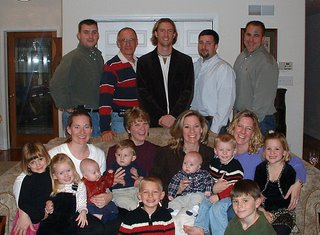Currently I am a member of three families: my biological family, my church family, and my Westminster family. While there are obvious differences between the three, there are also striking similiarities, especially when it comes to how we (Christian brothers and sisters) interact with one another. What makes our families different from others? It can't be a lack of dissension, that's impossible; and it can't be unconditional love, even non-Christian families often exhibit that. So what makes the Christian family different? Originally I wrote my reflections below for my biological family, so things like "screaming toddlers" of course don't apply to the other familial spheres, but you get the idea! My hope is that this will serve as a call to all my families (my Westminster family in particular at the moment) to love one another with reckless abandon:

My family is real. From the screaming toddlers to the tobacco-obsessed men, from the embarrassing childhood stories and the subsequent bellows of laughter to the pre-dinner prayers of blessing; we live and love, we fight and hurt, we want to love and be loved, we seek comfort and are sometimes left wanting. But my family is real, and by “real” I mean “not synthetic,” not man-made, but rather God-made. It's as real as the ocean's ebb and tide, and sometimes just as volatile. It's as real as the blustering wind, and often just as unpredictable. There's blood and guts in my family: when we fight we mean it but when we love it consumes us.
What makes it my family is each individual. Should one of us be absent, the absence is noted. In my family there is no such thing as “fitting in” even when one ends up being the sole-possessor of a particular opinion. Why? Because it isn't conformity of thought that binds us. It isn't having similar personalities, or liking boxed wine or sharing taste in clothes; it is by mere virtue of partaking of the same Covenant. We did not choose each other, and since this is so, it must not be expected that we will always get along. But rather God chose us to be a family, to support one another, to disagree with one another, but in dissension saying with our eyes (if not with our lips), “I love you.” For in the ways we love each other we manifest how we love God. If our love is conditional, we are saying we must be right with God for Him to love us, or that all must be right in our world for us to love Him. If we withhold forgiveness, we are giving God license to do the same with us. And when we fall on our faces before each other seeking forgiveness, it reflects us falling before our Maker.
My family is not perfect, but it is my family. My family is not perfect, but it was perfectly planned since the foundations of the earth for us to be the family that we are, with all our strengths and weaknesses, all our tears and all our laughter; and therein lies our bond. I love them for their love, and I love them in the midst of our collective, corporate pain. It may not always seem like it, but when one of us hurts, we all hurt, as in the groans of childbirth, as when the whole world cries out in its sin-brokenness. We are a covenant family, seeking to honor our God not just in our joy, but also in our pain. And no number of flaming arrows of Satan can rend that bond; it is eternal, even if our bodies are not.
This is my family.


